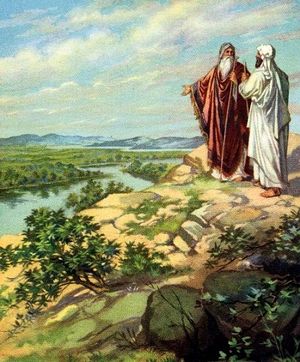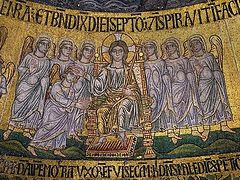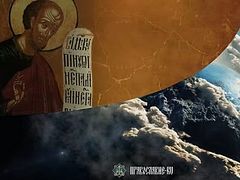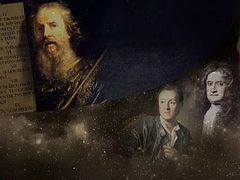Part 9. For Those Who Love God, All Things Work Together for Good
In this next conversation about the book of Genesis, Andrei Solodkov talks about what lessons can be drawn from the events in Genesis 13, wherein lies the wisdom of Abram and the error of Lot, and what a choice made without a blessing can lead to.
 Abram and Lot Thus, the Patriarch Abram and his wife Sarai left Ur of the Chaldees, a place of passions and vices, for the Promised Land—Canaan, a prefiguration of the Heavenly Kingdom. And they left with honor, finding themselves in a difficult situation, having overcome the temptation of poverty with dignity thanks to obedience and love for God and each other. Let us recall that All scripture is given by inspiration of God, and is profitable (2 Tim. 3:16), and the Old Testament is a schoolmaster leading to Christ (cf. Gal. 3:24). Now all these things happened unto them for examples: and they are written for our admonition, upon whom the ends of the world are come (1 Cor. 10:11).
Abram and Lot Thus, the Patriarch Abram and his wife Sarai left Ur of the Chaldees, a place of passions and vices, for the Promised Land—Canaan, a prefiguration of the Heavenly Kingdom. And they left with honor, finding themselves in a difficult situation, having overcome the temptation of poverty with dignity thanks to obedience and love for God and each other. Let us recall that All scripture is given by inspiration of God, and is profitable (2 Tim. 3:16), and the Old Testament is a schoolmaster leading to Christ (cf. Gal. 3:24). Now all these things happened unto them for examples: and they are written for our admonition, upon whom the ends of the world are come (1 Cor. 10:11).
Let’s continue reading the book of Genesis and open to chapter 13:
And Abram went up out of Egypt, he, and his wife, and all that he had, and Lot with him, into the south. And Abram was very rich in cattle, in silver, and in gold. And he went on his journeys from the south even to Bethel, unto the place where his tent had been at the beginning, between Bethel and Hai; Unto the place of the altar, which he had make there at the first: and there Abram called on the name of the Lord.
And Lot also, which went with Abram, had flocks, and herds, and tents. And the land was not able to bear them, that they might dwell together: for their substance was great, so that they could not dwell together.
And there was a strife between the herdmen of Abram’s cattle and the herdmen of Lot’s cattle: and the Canaanite and the Perizzite dwelled then in the land (13:1-7).
“See how the excess of riches immediately becomes a cause of division, creates a rupture, disturbs the harmony, and dissolves the bonds of kinship!” notes St. John Chrysostom.
The enemy of mankind seeks in every way to sow enmity between people, and in this case in the family of the Patriarch Abram. At the beginning of the history of mankind, the devil planted enmity in the first family, forcing Eve, and then Adam, to doubt the truth and love of God for man. Having no existence of his own, the devil takes occasion by the commandment (Rom. 7:11) and acts both then and today in the same way—working intrigue, exploiting in general the good beginnings given to man at his creation. After all, the purpose and meaning of human life consists in the pursuit of good, but the devil supplants the concept of well-being, distorting its meaning. Thus, God bequeaths to man to accumulate and hope for the riches of love, kindness, and mercy, which won’t be taken away from him, but man acquires earthly riches, thinking he will find peace and prosperity in them. But everything turns out differently. In pursuit of earthly riches, completely forgetting about Heavenly riches, man gradually notices that this earthly wealth doesn’t bring him that happiness he expected from it. Thus, disappointment, dissatisfaction, and as a result, despondency—a mortal sin—take possession of his soul, when man, deceived, loses all hope and ceases to see the meaning of continuing to live on earth.
The Patriarch Abram, having noticed the dispute between the shepherds, displays wisdom. Realizing that earthly goods aren’t the purpose of their exit from Ur of the Chaldees, he doesn’t hesitate to resolve the conflict, offering his nephew Lot to choose a parcel of land for his cattle so there would be no discord.
This is what he says:
And Abram said unto Lot, Let there be no strife, I pray thee, between me and thee, and between my herdmen and thy herdmen; for we be brethren. Is not the whole land before thee? separate thyself, I pray thee, from me: if thou wilt take the left hand, then I will go to the right; or if thou depart to the right hand, then I will go to the left.
And Lot lifted up his eyes, and beheld all the plain of Jordan, that it was well watered every where, before the LORD destroyed Sodom and Gomorrah, even as the garden of the LORD, like the land of Egypt, as thou comest unto Zoar. Then Lot chose him all the plain of Jordan; and Lot journeyed east: and they separated themselves the one from the other.
Abram dwelled in the land of Canaan, and Lot dwelled in the cities of the plain, and pitched his tent toward Sodom.
But the men of Sodom were wicked and sinners before the LORD exceedingly (Gen. 13:8-13).
Abram doesn’t hesitate to destroy the source of the quarrel. “You should do the same,” write St. Ambrose of Milan, “if you should happen to fall into a similar situation… Destroy the source of discord, for you are no stronger than Abram… It’s better to move amicably than to live together in discord.” It seems that in the wise decision of Abram and the advice of St. Ambrose, you can find many answers for resolving modern conflicts between relatives and in relations with business partners.
“How beautifully the high, noble personality of Abram is described in these simple words! From these words, it is already clear that Lot was ready to join the shepherds’ quarrel; but calmly and in a dignified manner, Abram reminds him that they are relatives, and implies that it is both improper for them to join the servants’ quarrel and dangerous, given that they’re surrounded by those of different tribes.”
There’s another important lesson in this story. As we read above, there was a strife between the herdmen of Abram’s cattle and the herdmen of Lot’s cattle, and it is noted: and the Canaanite and the Perizzite dwelled then in the land. Why are the Canaanites and Perizzites, who lived there at that time, mentioned? It’s no accident! The Canaanites and Perizzites were pagan peoples who were watching Abram and his people’s move into the Promised Land. They see that this people is neither weak nor small in number. They watch warily; they dare not attack, but wait—they wait, perhaps, for there to be strife, and that means a division, and if the division is not peaceful, then it’s a weakening. They await the right moment. It’s the same in modern Church life. There are ill-wishers and sectarians who, like modern-day Canaanites and Perizzites, are simply waiting for some strife and disagreement to arise in the Church so they can introduce a schism.
There’s another lesson that can be drawn from this story. Note that Abram acts wisely, but Lot—not quite reasonably, to put it mildly. Abram is the patriarch, and Lot the nephew and shepherd. Lot, as they would say now, violates the chain of command. It says: And Lot lifted up his eyes, and beheld all the plain of Jordan, that it was well watered every where, before the LORD destroyed Sodom and Gomorrah, even as the garden of the LORD, like the land of Egypt, as thou comest unto Zoar. Then Lot chose him all the plain of Jordan. Yes, of course, Abram allowed him to choose a plot of land at his discretion, but in choosing, Lot didn’t offer a prayer to the Lord asking Him how to proceed, and didn’t take a blessing from the patriarch—he didn’t say: “As you bless.” It would seem so, but is it appropriate to reproach Lot here? And what lesson can we take from this story? Let’s look a little further ahead and we’ll see what happened to the righteous Lot afterwards.
As it says, Lot pitched his tents near Sodom, but then, he was already living in Sodom itself: The desire to live near a wicked, but rich, people drew Lot to Sodom. Later, he fell into captivity with the people of Sodom during an armed conflict, and Abram freed him. However, this lesson didn’t do him any good, and he went to live in Sodom again. And as we know, Lot preached to this depraved people. But here’s an interesting fact: When the Lord destroyed Sodom and Gomorrah, only Lot’s wife and two daughters left with him. And then his wife, full of doubts, turned back, regretting the wealth left behind in Sodom, and turned into a pillar of salt. And later, his daughters would get him drunk and lead him into the sin of incest, and from them came the Moabites and the Ammonites—two peoples who would be at enmity with Israel throughout its history.
Let’s read about these events:
And the men said unto Lot, Hast thou here any besides? son in law, and thy sons, and thy daughters, and whatsoever thou hast in the city, bring them out of this place: For we will destroy this place, because the cry of them is waxen great before the face of the Lord; and the Lord hath sent us to destroy it.
And Lot went out, and spake unto his sons in law, which married his daughters, and said, Up, get you out of this place; for the Lord will destroy this city. But he seemed as one that mocked unto his sons in law.
And when the morning arose, then the angels hastened Lot, saying, Arise, take thy wife, and thy two daughters, which are here; lest thou be consumed in the iniquity of the city. And while he lingered, the men laid hold upon his hand, and upon the hand of his wife, and upon the hand of his two daughters; the Lord being merciful unto him: and they brought him forth, and set him without the city.
And it came to pass, when they had brought them forth abroad, that he said, Escape for thy life; look not behind thee, neither stay thou in all the plain; escape to the mountain, lest thou be consumed.
And Lot said unto them, Oh, not so, my Lord: Behold now, thy servant hath found grace in thy sight, and thou hast magnified thy mercy, which thou hast shewed unto me in saving my life; and I cannot escape to the mountain, lest some evil take me, and I die: Behold now, this city is near to flee unto, and it is a little one: Oh, let me escape thither, (is it not a little one?) and my soul shall live.
And he said unto him, See, I have accepted thee concerning this thing also, that I will not overthrow this city, for the which thou hast spoken. Haste thee, escape thither; for I cannot do anything till thou be come thither. Therefore the name of the city was called Zoar.
The sun was risen upon the earth when Lot entered into Zoar.
Then the Lord rained upon Sodom and upon Gomorrah brimstone and fire from the Lord out of heaven; And he overthrew those cities, and all the plain, and all the inhabitants of the cities, and that which grew upon the ground.
But his wife looked back from behind him, and she became a pillar of salt.
And Abraham gat up early in the morning to the place where he stood before the Lord: And he looked toward Sodom and Gomorrah, and toward all the land of the plain, and beheld, and, lo, the smoke of the country went up as the smoke of a furnace.
And it came to pass, when God destroyed the cities of the plain, that God remembered Abraham, and sent Lot out of the midst of the overthrow, when he overthrew the cities in the which Lot dwelt.
And Lot went up out of Zoar, and dwelt in the mountain, and his two daughters with him; for he feared to dwell in Zoar: and he dwelt in a cave, he and his two daughters.
And the firstborn said unto the younger, Our father is old, and there is not a man in the earth to come in unto us after the manner of all the earth: Come, let us make our father drink wine, and we will lie with him, that we may preserve seed of our father.
And they made their father drink wine that night: and the firstborn went in, and lay with her father; and he perceived not when she lay down, nor when she arose.
And it came to pass on the morrow, that the firstborn said unto the younger, Behold, I lay yesternight with my father: let us make him drink wine this night also; and go thou in, and lie with him, that we may preserve seed of our father.
And they made their father drink wine that night also: and the younger arose, and lay with him; and he perceived not when she lay down, nor when she arose.
Thus were both the daughters of Lot with child by their father. And the first born bare a son, and called his name Moab: the same is the father of the Moabites unto this day. And the younger, she also bare a son, and called his name Benammi: the same is the father of the children of Ammon unto this day (Gen. 19:12-38)
In the following conversations, we will return to this text, but for now, this is what I would like to emphasize: It would seem to be a small thing—to not take a blessing from the patriarch, but the consequences were very sorrowful: fruitless missionary preaching, Lot’s sons-in-law don’t take his words seriously, his wife is full of doubts and lives and acts looking back, his daughters are imbued with the spirit of Sodom, and the sin of incest becomes for them something to be taken for granted.
St. John Chrysostom writes: “You see how evil it is when you seek the best places but don’t look at the true benefit.”




